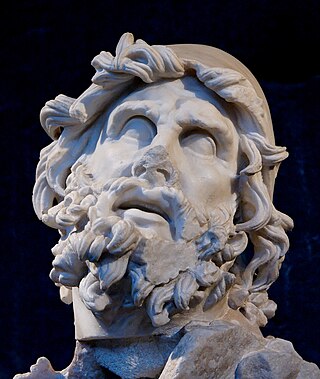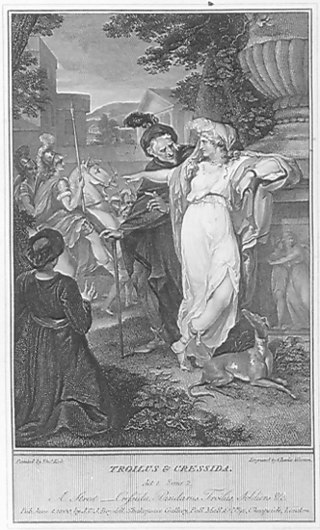Related Research Articles

In Greek mythology, Achilles or Achilleus was a hero of the Trojan War who was known as being the greatest of all the Greek warriors. A central character in Homer's Iliad, he was the son of the Nereid Thetis and Peleus, king of Phthia and famous Argonaut. Achilles was raised in Phthia along with his childhood companion Patroclus and received his education by the centaur Chiron. In the Iliad, he is presented as the commander of the mythical tribe of the Myrmidons.

In Greek and Roman mythology, Odysseus, also known by the Latin variant Ulysses, is a legendary Greek king of Ithaca and the hero of Homer's epic poem the Odyssey. Odysseus also plays a key role in Homer's Iliad and other works in that same epic cycle.

The Trojan War was a legendary conflict in Greek mythology that took place around the 12th or 13th century BCE. The war was waged by the Achaeans (Greeks) against the city of Troy after Paris of Troy took Helen from her husband Menelaus, king of Sparta. The war is one of the most important events in Greek mythology, and it has been narrated through many works of Greek literature, most notably Homer's Iliad. The core of the Iliad describes a period of four days and two nights in the tenth year of the decade-long siege of Troy; the Odyssey describes the journey home of Odysseus, one of the war's heroes. Other parts of the war are described in a cycle of epic poems, which have survived through fragments. Episodes from the war provided material for Greek tragedy and other works of Greek literature, and for Roman poets including Virgil and Ovid.

In Greek mythology, Iphigenia was a daughter of King Agamemnon and Queen Clytemnestra, and thus a princess of Mycenae.

James Shirley was an English dramatist.
This article contains information about the literary events and publications of 1708.

Sir Granville Ransome Bantock was a British composer of classical music.

Cressida is a character who appears in many Medieval and Renaissance retellings of the story of the Trojan War. She is a Trojan woman, the daughter of Chryses, a Trojan priest. She falls in love with Troilus, the youngest son of King Priam, and pledges everlasting love, but when she is sent to the Greeks as part of a hostage exchange, she forms a liaison with the Greek warrior Diomedes. In later culture she becomes an archetype of a faithless lover.

The Achilleid is an unfinished epic poem by Publius Papinius Statius that was intended to present the life of Achilles from his youth to his death at Troy. Only about one and a half books were completed before the poet's death. What remains is an account of the hero's early life with the centaur Chiron, and an episode in which his mother, Thetis, disguised him as a girl on the island of Scyros, before he joined the Greek expedition against Troy.

The Aethiopis, also spelled Aithiopis, is a lost epic of ancient Greek literature. It was one of the Epic Cycle, that is, the Trojan cycle, which told the entire history of the Trojan War in epic verse. The story of the Aethiopis comes chronologically immediately after that of the Homeric Iliad, and is followed by that of the Little Iliad. The Aethiopis was sometimes attributed by ancient writers to Arctinus of Miletus. The poem comprised five books of verse in dactylic hexameter.

Deidamia is an opera in three acts composed by George Frideric Handel to an Italian libretto by Paolo Antonio Rolli. It premiered on 10 January 1741 at Lincoln's Inn Fields Theatre, London.
Events from the year 1708 in Great Britain.
Nationality words link to articles with information on the nation's poetry or literature.
Now crowds to Founder Bocaj [Jacob Tonson] did resort
And for his Favour humbly made their Court.
The little Wits attended at his Gate
And Men of Title did his Levee wait;
For he, as Sovereign by Prerogative,
Old Members did exclude, and new receive.
He judg'd who most were for the Order fit,And Chapters held to make new Knights of Wit.
Honoria and Mammon is a Caroline era stage play by James Shirley, first published in 1659 though not produced until 2013. It is a revision and expansion of Shirley's earlier morality play A Contention for Honor and Riches, and illustrates the persistence of influence of archaic forms of drama through the final phase of English Renaissance theatre.
Cupid and Death is a mid-seventeenth-century masque, written by the Caroline era dramatist James Shirley, and performed on 26 March 1653 before the Portuguese ambassador to Great Britain. The work and its performance provide a point of contradiction to the standard view that the England of Oliver Cromwell and the Interregnum was uniformly hostile to stage drama.
The Triumph of Beauty is a Caroline era masque, written by James Shirley and first published in 1646. The masque shows a strong influence of Shakespeare's A Midsummer Night's Dream.

The Iliad is one of two major ancient Greek epic poems attributed to Homer. It is one of the oldest extant works of literature still widely read by modern audiences. As with the Odyssey, the poem is divided into 24 books and was written in dactylic hexameter. It contains 15,693 lines in its most widely accepted version. Set towards the end of the Trojan War, a ten-year siege of the city of Troy by a coalition of Mycenaean Greek states, the poem depicts significant events in the siege's final weeks. In particular, it depicts a fierce quarrel between King Agamemnon and a celebrated warrior, Achilles. It is a central part of the Epic Cycle. The Iliad is often regarded as the first substantial piece of European literature.

Troilus and Cressida is a play by William Shakespeare, probably written in 1602.
Troy is an opera in two acts by Bujor Hoinic set to a Turkish-language libretto by Artun Hoinic, based on the ancient Greek epic poem Iliad by Homer. It premiered in Ankara, Turkey, in 2018 and was restaged at Bolshoi Theatre in Moscow, Russia, in 2019.
Gavin Bantock is an English poet; he is the grandson of Granville Bantock. He was born in Barnt Green, and attended New College, Oxford, where he won the Richard Hillary prize for poetry. He traveled to Japan in 1964 on the advice of his father, Raymond, and returned five years later to teach at Reitaku University. He has remained in the country ever since. Initially teaching English language and literature at Reitaku, he began also leading a group of students in productions of English plays, which eventually became his primary career. After retiring from Reitaku in 1994, he became the drama coach at Meitoku Gijuku High School in Kochi.
References
- 1 2 Chatterjee, Etta (16 May 2019). Ajax - a study of the impact and reception of the myth of Ajax and Sophocles’ Ajax in Western culture (PDF) (D.Phil thesis). King's College London. pp. 216–7. Retrieved 30 January 2024.
- ↑ Edwin F. Ochester, "A Source for Shirley's The Contention of Ajax and Ulysses," Notes and Queries 17 (1970), p. 217.
- 1 2 Shirley, James (1833) [1659]. Gifford, William; Dyce, Alexander (eds.). The Dramatic Works of Shirley. (6 vols.). Vol. VI. London: John Murray. pp. 369, 396–7.
- ↑ Henry Van Dyke and Hardin Craig, eds., Little Masterpieces of English Poetry, Vol. 7, New York, Doubleday, Page and Co., 1907; p. 9.
- ↑ Robinson, Michael (31 October 2008). "Edward Coleman (a)". The Diary of Samuel Pepys. Retrieved 30 January 2024.
- ↑ Cutts, John P. (1969). "Seventeenth-Century Songs and Lyrics in Paris Conservatoire Ms. Res. 2489". Musica Disciplina. 23: 121, 134 [pdf 19]. JSTOR 20532047.
- ↑ Ritson, Joseph (1813). Park, Thomas (ed.). A Select Collection of English Songs with their Original Airs, vol. III. (3 vols.). London: Printed for F. C. and J. Rivington et al. pp. 254–5 [265].
- ↑ Brydges, Samuel Edgerton (1807). Censura Literaria... Vol. IV (New series, vol. 1). London: Longman, Hurst, Rees, and Orme. p. 385.
- ↑ Roberson, Matthew A. (2006). Of Priests, Fiends, Fops, and Fools: John Bowman's Song Performances on the London Stage, 1677–1701 (D.Phil dissertation). Florida State University Libraries. pp. 5–6. Retrieved 31 January 2024.
- ↑ Parry, C. H. H. "The Glories of our Blood and State" (PDF). via IMSLP. Piano score. London: Novello.
- ↑ Bantock, Granville (1 June 1910). "Extra Supplement: The Glories of Our Blood and State". The Musical Times. 51 (808). JSTOR 907402.